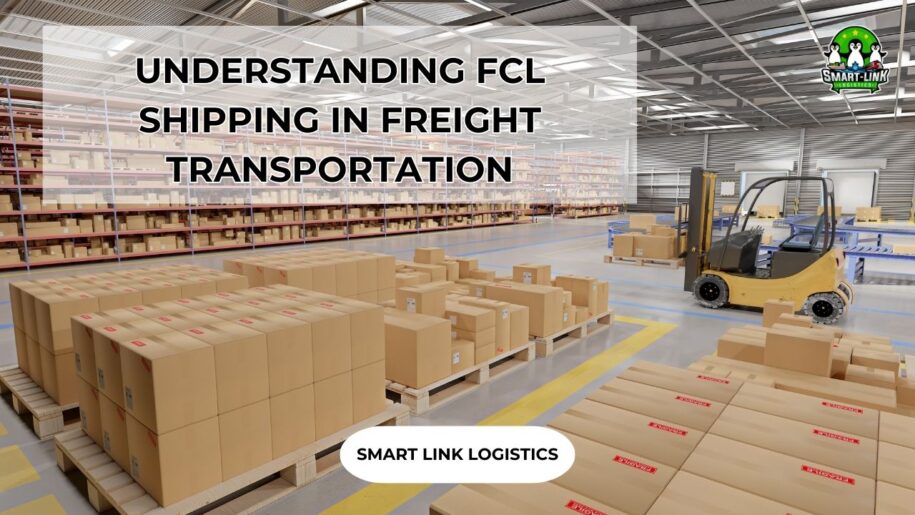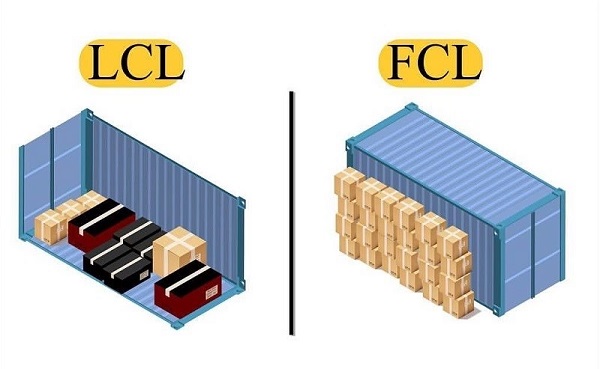
UNDERSTANDING FCL SHIPPING IN FREIGHT TRANSPORTATION
FCL (Full Container Load) is a familiar term in the field of transportation and logistics, offering many benefits such as better control over goods, enhanced security, and faster shipping times. So, what exactly is FCL? In this article, let Smart Link guide you through a deeper understanding of FCL, its advantages and disadvantages, and a comparison with LCL shipping to help you choose the most suitable solution for your business transportation needs.
1. What is FCL (Full Container Load)?
FCL (Full Container Load) refers to a shipment that occupies the entire space of a container without sharing it with other shipments. When using FCL, the business rents the entire container and is responsible for loading the goods, while the recipient is responsible for unloading the goods upon arrival.
FCL is typically chosen when the quantity of goods is large, or when a business wants to ensure the safety and security of its goods during transport. With FCL, the container is sealed with a seal and is not opened until it reaches its destination.
In contrast to FCL is LCL (Less than Container Load), where goods from multiple customers are consolidated into a single container to optimize space and reduce transportation costs.

2. Advantages and Disadvantages of FCL Shipping
Many businesses often hesitate when choosing the right shipping method. Let’s explore the pros and cons of FCL.
2.1. Advantages of FCL
FCL shipping offers the following benefits:
- High security and safety: Goods are stored in a separate container, sealed with a seal, ensuring security and safety throughout the shipping process.
- No delays due to shared cargo: Since the container only contains the goods of one customer, there are no delays caused by the loading or unloading of other parties’ goods.
- Better control over goods: The shipper has full control over the goods inside the container, allowing for better organization and packing to ensure efficient transport and minimize damage.
- Reduced risk of damage: Goods are not exposed to those of other shippers, reducing the risk of collision or damage.
2.2. Disadvantages of FCL
However, FCL also has some limitations:
- High cost: Compared to LCL, FCL is more expensive as the shipper must pay for the entire container, even if the space is not fully utilized.
- Not ideal for small shipments: FCL is not a cost-effective option for small shipments.
3. Export Customs Procedures for FCL Shipments
For FCL shipments, the export process involves the following steps:
- Select a transportation company, negotiate the contract, and receive shipment details.
- Prepare and inspect the goods for export.
- Book space on a vessel and reserve a spot with the carrier.
- Transport the empty container to the warehouse for loading.
- Declare and complete export customs procedures.
- Finalize the necessary export documents.
- Send documentation to the exporter.
4. Comparison between FCL and LCL
FCL and LCL are two opposite shipping methods. Depending on your needs and the characteristics of your goods, you can choose the most suitable option. Here’s a comparison between the two:
- Cost: FCL is generally more expensive than LCL because the shipper must pay for the entire container, regardless of how full it is. In contrast, LCL has lower costs as the container space is shared among multiple customers.
- Shipping time: FCL typically offers faster shipping times since the container doesn’t need to wait to be filled like LCL.
- Risk to goods: FCL shipments face less risk of damage or loss compared to LCL shipments.
However, these factors can vary depending on the specific shipment and carrier. To make the best decision, it is recommended to consult with transportation service providers or experienced individuals.
Conclusion
We hope that the information shared by Smart Link helps readers gain a better understanding of FCL (Full Container Load) and its characteristics, advantages, and disadvantages, making it easier to choose the most suitable shipping method. Thank you for taking the time to follow this article! We hope that the insights provided will be helpful to both individuals and exporting companies.
Hotline: + 84 935 766 039 to know more about our services

If you require assistance with international import and export of goods, please contact our team at Smartlink Logistics. We are available to provide you with professional guidance on our services and the necessary customs procedures.
SMART LINK: BEST SERVICE BEST YOU


































